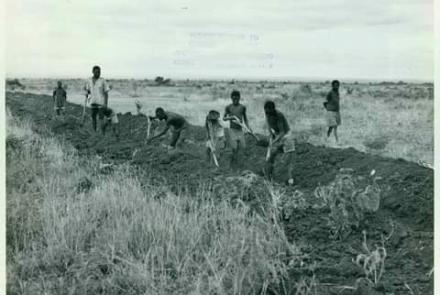Kenyatta and KAU
When he arrived back in Kenya, Kenyatta found that KCA had been proscribed but its members were still active, but underground. He was told by the welcoming committee that the KCA spirit was still underlying the political battle for human rights. After the government banned KCA during the Second World War, there emerged a broader-based Nationalist party, the Kenya African Union (KAU). The prime movers behind this were the Koinange family. After his arrival, Kenyatta remained uncommitted in politics until he was elected the President of KAU on 1st June 1947, with James Gichuru stepping down to make way for him. He took it upon himself to build KAU into a united and ordered party. This proved a challenge as he sought to establish himself as the accepted leader of the whole Kikuyu tribe and also to bring all other tribes of Kenya with the call for self-government.
Until the 1950’s, KAU was facing crisis and Kenyatta’s leadership was not proving a success; the moderates who led the party had failed to win concessions from the government and had also failed to nurture a broad-based support with very few politicians from the Coast or Nyanza standing for the party. Kenyatta and other KAU leaders were seeking to build support among the Kikuyu. This was to be achieved through the administering oaths to carefully chosen individuals whose seniority, influence and authority would consolidate the position of the party. The oath taking was however for the reliable, experienced, generally older men, not for the young ones, the militants among those returning military service in the Second World War or among the urban unemployed. The oath added secrecy to a political situation which was already fluid and in 1948, a new word, Mau Mau, came into usage which purported to belong to an underground terrorist movement pledged to kill every white man in Kenya. This Association was outlawed by the government in August 1950.
On 23rd April 1950, KAU and The East African Indian National Congress opposed the Kenya plan, updated by Grigg. The East African Trade Union Congress called for a boycott of the National City Charter celebrations in March 1950. Two assassination attempts followed, one on the moderate non-Kikuyu, Tom Mbotela, who was a senior KAU official and a strong opponent of oathing; and the other, on Muchohi Gikonyo a leading Kikuyu City Councilor. Fred Kubai and Makhan Singh were arrested for being members of an unregistered trade union, after which followers came out in a general strike. This time Kenyatta and other KAU leaders were opposed to the strike.
At the same time, the militants, called The Forty Group, were moving against the moderates within KAU, sweeping the old officers from their positions. Kubai became Chairman, Kaggia, General Secretary and Paul Ngei, Assistant Secretary. They immediately repeated their call for independence within three years. Kenyatta moved with the times by giving to them his support and in October, he produced a KAU flag, green, black and red, that implied a non-racial objective for the African independent movement.
Nevertheless, the pressure on Kenyatta mounted with KAU virtually in the hands of the younger men in Nairobi. In January 1952, they formed their own secret Central Committee and began to build a network of subordinate secret cells throughout Kikuyu-land. They made secret plans for armed rebellion and a tariff was placed on any arms and ammunition collected. Anyone suspected of betraying information to the administration was likely to be murdered, African police disappeared, bodies turned up in rivers and those who did not cooperate by taking the oath or otherwise helping the movement, were beaten. Despite attempts by Kenyatta to make KAU inter-tribal, Kikuyu were cutting themselves off from the rest of Africans in Kenya.
Kenyatta did not publicly approve of the Mau Mau; but was for the option of self-governance through peaceful means. The settlers at the time were pushing the government to declare a State of Emergency. After that there was an attempt for the press to issue a statement that the call for self-governance along African nationalist lines was in it seditious.
On 16th August, Waruhiu Itote, ‘General China’ was one of a party of eight young men who came to see Kenyatta after the Central Committee had ordered selected units to set up guerrilla bases in the forest. Kenyatta offered them advice and told them he was with them in everything that they did. Kenyatta by then knew that his constitutional approach had failed and that the confrontation with the British could no longer be delayed.
At this point, Kenyatta was seen by some as a solitary figure, but in reality, he stood above the rest. His experiences in Moscow, London and his association with the Pan-African movement all gave him political maturity and knowledge of the world unattained by most others. He did not seek personal advancement under the colonial system but longed for cultural acceptance but was denied him by the racial prejudices of the settlers. He was now in his fifties and, until the upsurge of militancy, he enjoyed a comfortable life between his farm at Gatundu and his house at Githunguri. He had also by then taken his fourth wife Ngina, one of the young girls attending his college. She was a daughter of a chief from his area of Ngenda and she had presented him with a daughter, Kristina.


